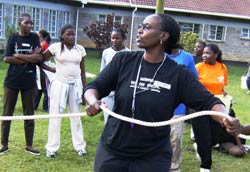Multiplying the impact of reproductive health research
May / June 2011 | Volume 10, Issue 3

Photo courtesy of KEMRI
Fogarty grantee Dr. Elizabeth Bukusi leads
team building exercises to instill a sense
of mission among research trainees
in Kenya.
By Steve Goldstein
Dr. Elizabeth A. Bukusi is not the first child of a Kenyan parent to stand at a Capitol Hill podium with the seal of the U.S. Senate. But it’s doubtful that even former Sen. Barack Obama had an audience more rapt as she recounted the story of a Kenyan girl named Atieno who died during childbirth of a postpartum hemorrhage. She was 15.
"Does research make a difference? I think it might," she said. "And it should be able to make a difference for someone like Atieno and a child she might bear." In order for women like Atieno to have a choice, there must be support for scientific research and capacity building. "I’m a Fogarty scholar and part of my training was in the U.S.," she told the group, "and because of that I need to give back to people in my country who have not been able to get such training."
For Bukusi, advances in global health research mean something tangible: saving lives. In her work in Nyanza in western Kenya, where she is the chief research officer and deputy director of research and training at the Kenya Medical Research Institute (KEMRI), she sees the need for better drugs, vaccines and diagnostic tools every day - especially with 30 percent of all pregnant women testing HIV positive.
"There is hope," Bukusi said. In her region - at the heart of the epidemic - she is responsible for a program funded by the President’s Emergency Plan for AIDS Relief that’s providing care for about 100,000 people. "Women can come to the clinic, they can get treatment and they can prevent their children from getting HIV," she said. "The challenge is building capacity and expanding care.
One of Bukusi’s favorite phrases is "multiplier effect," and she is its best exemplar. The daughter of an accountant, she trained to be a pediatrician, but when the "flame of HIV" began burning in her country in the late 1980s, she switched to reproductive health. At the University of Nairobi, she earned degrees in obstetrics and gynecology.
Thanks to Fogarty’s AIDS International Training and Research Program (AITRP), Bukusi completed her Ph.D. at the University of Washington, where she’d also received her MPH. During her groundbreaking dissertation study on the male factor in bacterial vaginosis, she and UW professor Dr. King Holmes successfully applied for a Fogarty International Research Collaboration Award (FIRCA) grant to support her work.
In the early 1990s, Bukusi met an American AITRP scholar named Craig Cohen who had studied and worked in Kenya and they began a research partnership that’s lasted 18 years. With Cohen, she co-directs a Fogarty-funded infectious disease training program to build capacity in East Africa. Last year, she and Cohen, now an ob-gyn professor at the University of California, San Francisco, received a Fogarty grant to restructure the ethical review process at KEMRI.
"I was concerned that research regulation wasn’t being done as well as it should, causing bottlenecks that created delays," she explained. The work supported by the grant led to her appointment as deputy director.
Bukusi, who was in Washington, D.C. to appear at a conference sponsored by the Global Health Technologies Coalition, travels widely to speak about reproductive health issues in sub-Saharan Africa and her goal of making a difference in the lives of women.
So when Bukusi speaks to young medical students, she thinks of Atieno and the difference that research and capacity building may have made. Research is the key to the multiplier effect, she exhorts her students. "It may be a long time before you have an impact," she tells them, "but when it happens you will touch the lives of millions of people who may never know you by name, but you will have changed their lives dramatically."
More Information
To view Adobe PDF files,
download current, free accessible plug-ins from Adobe's website.